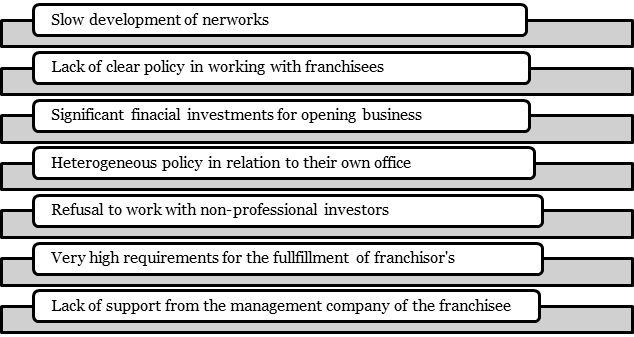The use of franchising schemes is a traditional practice for tourism enterprises abroad and is gaining popularity in Russia. The fact that franchising is an effective scheme for achieving success in local and international markets is confirmed by the experience of such giants of the tourism industry as the American travel networks Woodsidetravel, BTI, Uniglobetravel and AmericanExpress. There are such franchised travel systems in Europe. Examples are ThomasCook, Nekkerman and TUI. Many of them have been successfully operating on the market for more than three decades [1, p.35].
For the Russian market, such schemes in the industry are a relatively new solution, thanks to which, at minimal cost, one can obtain legal access to international travel systems and compete with domestic market players.
In the history of domestic travel franchising, the pioneer was the Russian “Wind Rose”. The company was established in 1988 and existed until 2010. For more than 20 years of presence on the market, it has developed into a developed network of travel agencies [2, p.134].
Intourist JSC became the second seller of travel franchises in Russia. This company is a veteran of the domestic market. It was created back in 1929. In 1994, Sunrise Tour, a well-known tourist network, began its work.
After another 4 years, in 1998, the Last-Minute Voucher Shop was opened, which a year later began to operate as a franchise network. In this case, all the classic terms of sale of the franchise were accepted. Its participant got the opportunity to work under a well-known brand, received free advertising support, he was given access to direct contacts to the best tour operators who offered the most favorable conditions. When purchasing the franchise of the Last-Minute Voucher Shop, a number of restrictions were imposed on the franchisee. The use of other trademarks is prohibited, it is required to carry out all activities strictly in accordance with the corporate standards of the network. A participant in a franchise scheme is prohibited from using methods of unfair competition, dumping other franchise participants.
Since 2001, the main competitor on the franchise market in the tourism industry has become “Where.Ru», Also specializing in the sale of franchises. As a response, the Last-Minute Voucher Shop has created a network of Vell agencies, the main goal of which is to expand on the franchise market in domestic tourism [3, p.288]. These are inexpensive compared to franchise counterparts, which cost franchisees significantly less in terms of royalties and the size of the initial fee. In this way, an attempt was made to attract additional participants to the saturated market.
At the moment, there are many competing enterprises in the domestic tourism industry. Many of them are agent networks and offer to join them on a franchise basis. But the largest players in the market are the ones mentioned earlier.
The organization of a business in the field of tourism on the basis of a franchise scheme is based on the interaction of two entities – the franchisor (owner and seller of the franchise) and the franchisee (buyer of the franchise). Each of them strives to maximize profits with minimal risk. And at the same time, they are interested in mutual success. The franchisee makes a profit in the course of its activities, saving on advertising and promotion, since it enjoys the reputation and fame of the franchisor, who provides him with all kinds of support. The franchisor receives a share of the profits (royalties) from the profits of each franchisee; therefore, he does everything to ensure that each partner is successful in business [3].
With the development of domestic franchising, all franchise participants are making more and more stringent requirements to each other [5]. This means that a civilized model is being formed in the domestic business space, which is close to the western one. Thus, when deciding organizational issues related to the management of relationships between participants in a franchise scheme, it should be addressed taking into account the operating conditions of the entire system as a whole, the situation on the market and in the industry [6].
If we consider the prospects for the development of this form of management, then we should recognize its expediency, especially for owners who have been on the market for a long time and have achieved success. The main advantages of participating in a franchise scheme are presented in Figure 1.

Figure 1. Advantages of franchising in the tourism industry
In addition to the advantages presented in Figure 2, franchising provides the necessary uniqueness of services in the region, as stipulated in the agreement. When organizing an independent travel agency, it risks facing competitors.
Despite the obvious and significant advantages, the tourism franchise scheme has a number of disadvantages (Figure 2).

Figure 2. Disadvantages of franchising in the tourism industry
Despite the disadvantages indicated in Figure 2, franchising has a well-deserved reputation for being an efficient, safe and profitable form of business organization that benefits all participants.
The tendency to expand the use of such schemes in the domestic tourism industry is obvious – every year the number of franchise outlets increases by about a quarter. Young entrepreneurs are interested in such models; they are the ones who are most active when participating in the Regional Franchising Development Program (RAF).
The development of franchising in domestic tourism is determined, firstly, by the stabilization of the socio-economic situation, as well as an increase in the number of players in the market and a proportional increase in competition. Therefore, in the near future, we should expect an increase in the popularity of this business model.
References
- Zemlyakov D.N., Makashev M.O. Franchising. Integrated forms of business organization. – M.: Unity-Dana, 2009. – 35 p.
- Katz R.B. Franchising: company building, accounting, legal aspects. – M.: GrossMedia, 2011. – 134 p.
- Kolesnikov V. Building a franchise business: a course for copyright holders and users of franchises. – SPb .: Peter, 2008 .– 288 p.
- Business bazaar. [Electronic version]: http://www.delovoybazar.ru. (Date of access: 23.02.2013).
- Franchising and ready-made business. [Electronic version]: http://www.franchising.msk.su. (Date of access: 23.02.2013).
- Russian Association of Franchising (RAF). [Electronic version]: http://ru.rusfranch.ru/activities/activities_strategy/draft_documents.php. (Date of access: 23.02.2013).
